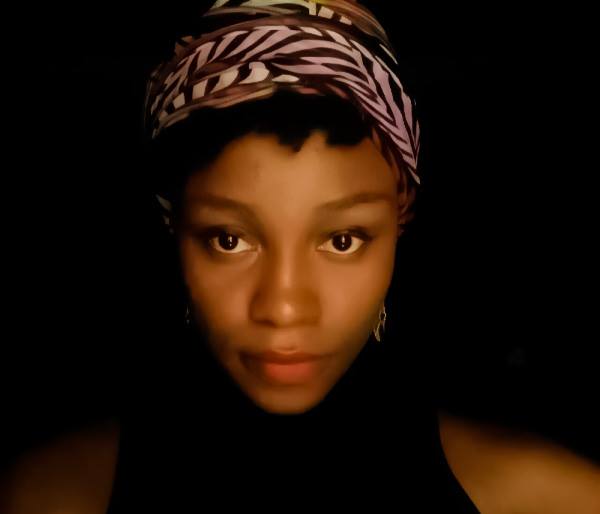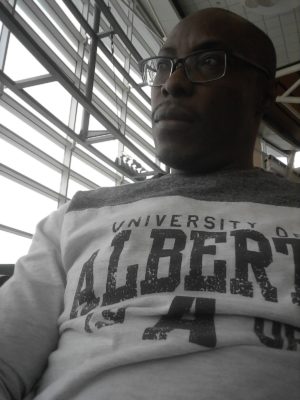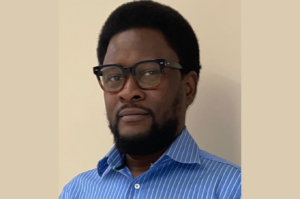
Kechi Nomu is a Brunel International African Poetry Prize finalist. Her poetry has been accepted for publication in The Railto, Inter|rupture, Bangalore Review, Enkare Review, Expound magazine, Brittle Paper, and elsewhere. Between 2017 and 2018, she co-curated the Poets Talk Series for African poets. Her poetry chapbook Acts of Crucifixion (Akashic Books, 2018), was chosen by Kwame Dawes and Chris Abani for publication as part of the African Poetry Book Fund Box Set (Tano). Her nonfiction has been published by openDemocracy, The Theatre Times, Voices of Africa, HOLAAfrica! and Invisible Borders. In 2019, her work was exhibited as part of Re-imaging Futures: A Trans-Nigerian Conversation with Invisible Borders as winners of the 2018 Apex Art curatorial grant.
In this interview, we discuss her chapbook. Acts of Crucifixion is a deeply resonant text that takes the reader on a walk through the city to map the loss, brokenness, and yearning that haunt intimacies and relationships. There’s a casualness with which she probes into questions of love, mortality, and memory, as though these themes deserve so little engagement, but this casualness belies the precise, plaintive tones with which each poem is layered. We discuss all this and more in this week’s interview.
Uche
Men, women, dreams, love, bodies – the brokenness of it all. Brokenness is, for me, the overarching theme of your chapbook Acts of Crucifixion. What attracted you to poetry? Can you describe what the process of writing a poem is like for you? What decides the form and rhythm a poem such as “3 Women” or “It Comes in Waves” would take? What is poetry to you?
Kechi
The question of the unending melancholy in my poems is one that I encounter in different forms. One that I struggle with accepting. I understand though that it can be the most obvious thing that confronts a reader of my poems. But, beyond my instinct to resist, I think writing about broken people is a way to subvert ideas about national taxonomies like “the happiest people on earth”. It’s a way to sneak in edge-wise with evidence. About the form a poem takes, I am reminded of the street photographer Garry Winogrand who had an interesting idea of his work. He took pictures in areas of New York that were constantly in motion and full of incidents, and thought of this as working in areas where content almost overwhelms form. I think of the forms of these poems as being in conversation with photographs like that or the installations and found-object sculptures of Fabio Mauri.
Uche
Much of your poetry contemplates loss, but it also talks about love “doing a caesarean thing in your chest” and the fragility of flesh. What draws you to questions of mortality? What conversations do you think poetry allows you to have with your readers?
Kechi
I like the idea that I am in some way contemplating the fragility of the flesh. It’s such a grand idea and I’ll be stealing it, thank you. But I was simply thinking of the poet persona as an ideal citizen of a totalitarian state. I wanted very much to imagine someone conflicted by the complacency they had chosen.
Uche
Your poems are full of biblical imagery, and God features in some poems. In “3 Women”, the speaker’s mother: “feeds us God,” while the girl bomber “only wanted to see God.” Can you speak more about the influence of religion on your poetry and your fascination with its imagery?
Kechi
I recognize, each time I attempt to reread these poems, an extension of conversations I have with my mother in my head, in which we talk about this idea that purity is a form of self-annihilation. To be pure is to die. And the God in these poems is a stand-in for something mutable in its form and function. Not necessarily a deity, but some kind of force potent enough to disregard reason. But, yes, the biblical imagery comes from the tensions I have about faith. It runs deep.
Uche
“Night Market” paints the familiarity of tragedy in Lagos, the scene of a truck crushing people to death. The poem starts on a note of intimacy, a pleasant reminiscence, but the last line comes off with a jolt: “our dead did not become angels or gods.” I am curious about that line. Can you explain what you mean by that? And what inspired that line?
Kechi
That line, the whole of that poem was, for me, a dirge. Just that. I was thinking about mournable bodies and the kind of impotence that becomes apparent in the face of tragedies like this. I was thinking of how incidents like this become ordinary placed within the context of everything else that keeps happening as places slip into states of dystopia. I was watching people move on with their lives and I wanted to make an inventory about the flow of time and proximities. In the second that it took for people to move from one point to another within a space that is local and intimate, some lives were altered forever. I wanted to say that somehow. But what came out of all of that was “Night Market”.
Uche
“A Poem about Falling” touches upon innocence and experience, evoking an Edenic period of childhood. It also evokes the erotic: “our bodies touch & entwine,” while alluding to fallen women, fall from grace, and Eve. In “Giving Head”, the poet persona reflects: “Mouthful, how long does a person not breathe/before they stop altogether?” Can you talk about your experience of writing about female sexuality?
Kechi
I am not certain that these were attempts to write about female sexuality as much as they were attempts to write about sexuality period. The speakers just happen to identify as female. I am interested in how patriarchy demands an exaggerated performance of masculine sexuality/prowess and feminine virtue, but I more interested in very personal stories of sexuality and in writing these poems I had no patience for safe words or euphemisms. There is a lot that is beautiful about the drama of the intimate set against the epic of our lives. Of course, there is a conversation to be had about the policing of sexuality and gender. But in these poems, I wanted to celebrate sexual awakening, first loves, agency, and just good old casual sex.
Uche
Some of your contemporaries have produced poems of great resonance, and that includes you. How do you account for the visibility your generation is currently enjoying? What do you think about the stories they tell with their poetry?
Kechi
I am wary of any kind of visibility that is exclusive. I love that poets are becoming rock stars but I’m more interested in thinking of poets in conversation across categories. The singular, successful poem or poet is a very seductive thing, but it’s very limiting for me. Some of the poems that are real to me are from writers who work outside visibility and I want to celebrate this moment but always remember that. What do I think of the stories they tell? I have conversations with writer friends where we talk with longing about the freedom to write outside of what the existing structures are willing to reward, beyond the constraints of genre. There is a sense that this is becoming increasingly possible. Sometimes, I just stand back and think, what a time to be alive!
Uche: Memories haunt your poetry – memories of mothers, fathers, lovers, of “old bones” and “ghosts”. From your experience in writing this collection, how does poetry help you make meaning out of memory? Could you talk a bit about the correspondences between poetry and memory? How do you decide which of “the past” is the stuff of poetry?
Kechi
The ghost story is what occurs when accumulation doesn’t culminate. These words are by the essayist Durga Chew-Bose whom I adore at the moment. She says this in her piece on Personal Shopper by the French filmmaker Olivier Assayas who says this of grieving and closure: moving on, as a concept, is for stupid people, because any sensible person knows grief is a long-term project. There is a sense for me that the only possible way to be Nigerian is to keep moving on, to never have the conversations about what has happened beyond stiff parameters. This is the constant state of being. We have invented a lot of colourful/bland language for not talking, most of it rooted in religion and limiting ideas about culture. And any poem I write comes out of the place where I am attempting to make an archive of private memory. It can get pathetic really when I’m visiting home. I keep asking these probing questions about things no one wants to talk about really. My long-term memory is a really weird space.
Uche
There is an ordinariness with which the poet persona describes sufferings and death, as though they were inconsequential. For instance, “My Father Sings,” “Acts of Crucifixion” and “Postscript: Four Boys are Murdered One Morning in Aluu,” are just a few of such poems. Would you regard this tone/quality as deliberate? Moreover, I would like you to expand on the place of language in your work, because I find that there is a direct, matter-of-factness in the language of your poetry. For instance, the speaker says,
This is where all the poetry begins;
on a street
where a body has bombed itself in search of God.
What is it about language that interests you?
Kechi
I am right now reading The Ongoing Moment by Geoff Dyer and intrigued by his fascination with cataloguing. Dyer considers his seminal text on the history of photography in America to be really an extended series of captions. The idea of an inherent poetry in cataloguing what is considered apparent. This idea is not new. Walt Whitman’s poetry is filled with plain seeming descriptions of incidents that somehow manage to transcend their ordinariness, as it were. Dyer calls this the poetry of comprehensive contingency. I think words are responsive in the ways that they seep into one another and suggest meaning. I am constantly looking to find that kind of naturally occurring seepage when I write a poem. Some of these poems are the poet persona working his/her way towards feeling something, anything. And I suppose the question for me is always how to stay open and sensitive, and put that on a page.
Uche
One gets a sense of an itinerant poet, for you conjure a lot of street-side happenings in some poems. To what extent is the street a poetic trope for you? How does geography work for you and how important is it to your writing?
Kechi
What comes to mind is the word barfly. I am the equivalent of this, but what I subsist on is the road and its possibilities, encountering what is human, felt and often unwilling to lend itself to expression. More than the larger question of geography, I am always thinking about the hyperlocal place and its constant metamorphosis. It shapes how I see the world.
Uche
I know Akashic Books is based in the US. Can you tell us a bit about how you got them to publish your poetry?
Kechi
The African Poetry Book Fund works with Akashic Books to publish a chapbook series for African poets every year. I sent in my entry and was thrilled that it was selected.
Uche
Finally, who are the important poetic influences that you have had? How soon do you hope to produce a full-length volume?
Kechi
I’d like to be able to give a concise list but anything that moves me counts. This always includes: the poetry of António Agostinho Neto, Adrienne Rich, and Zainabu Jallo because encountering their works at different points in my life convinced me to write poetry. I recently read a poem by Safwan Khatib selected by Safiya Sinclair, “empire with a harp inside it”. I am yet to recover from that. Monochrome photographs of Isamu Noguchi’s playground equipment for the Ala Moana Park in Hawaii continue to haunt me. All of these count as poetic influences for me. But, also, I am emboldened by every single poem I find in any journal for Africans by Africans. In the meantime, a full-length volume is in the works.
About the Interviewer:
 Uchechukwu Peter Umezurike is a PhD student at the department of English and Film Studies, University of Alberta. His research interests include postcolonial literatures, print culture, gender and sexuality studies. An Alumnus of the International Writing Program (USA), his work has appeared in several print anthologies such as On Broken Wings, Dream Chasers, Migrations, African Roar 2011, Daughters of Eve and Other Stories, Work in Progress & Other Stories, A Generation Defining Itself (Vol. 8),Weaverbird Collection, New Nigerian Writing, Water Testament, Calvacade, Author Africa, and Camouflage, etc.
Uchechukwu Peter Umezurike is a PhD student at the department of English and Film Studies, University of Alberta. His research interests include postcolonial literatures, print culture, gender and sexuality studies. An Alumnus of the International Writing Program (USA), his work has appeared in several print anthologies such as On Broken Wings, Dream Chasers, Migrations, African Roar 2011, Daughters of Eve and Other Stories, Work in Progress & Other Stories, A Generation Defining Itself (Vol. 8),Weaverbird Collection, New Nigerian Writing, Water Testament, Calvacade, Author Africa, and Camouflage, etc.









COMMENTS -
Reader Interactions